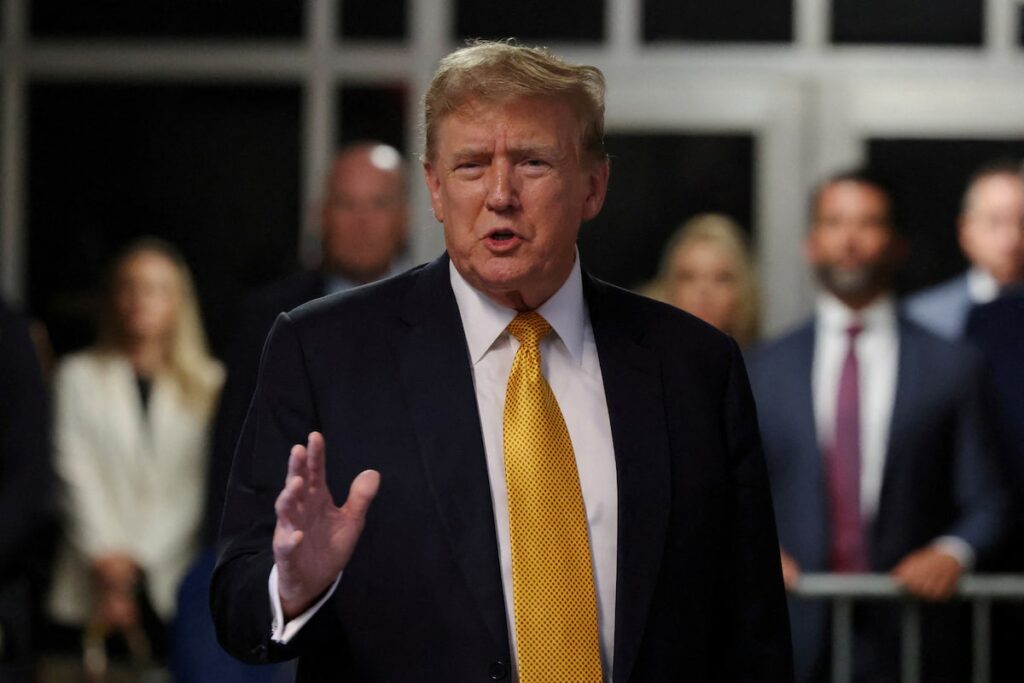Hopes are fading that Donald Trump's multiple legal problems will seriously damage his campaign.
The protracted hush money trial has not hurt his approval ratings in public opinion polls. Most legal experts predict either a acquittal or a disagreement. Even if he is found guilty, it is unclear whether there will be any major negative consequences.
Unfortunately, trials on the other three more serious charges are all expected to be postponed until after Election Day on November 5th.
Trump maintains leads in nearly every battleground state that could decide the election, President Joe Biden may get some economic help from planned interest rate cuts, and the abortion issue could help boost Democratic turnout.
However, Prime Minister Justin Trudeau, who clearly supports Mr. Biden's re-election, will need to pay close attention to the possibility of Mr. Trump returning to power. Similarly, Conservative Party Leader Pierre Poilievre, who has little diplomatic experience, has never traveled to the United States to consult with senior Biden administration officials or Trump's aides. Poilievre may soon face one of them as prime minister.
Trump shows no signs of moving away from his ugly protectionist America First policy. He has talked about imposing a 10% tariff on all imports, a measure that would cripple Canada's economy.
Prime Minister Trudeau visited Philadelphia on Tuesday and said any future punitive action against Canada “would also have a negative impact on American jobs.”
He made that argument repeatedly to Trump between 2016 and 2020, and it helped him navigate a rocky relationship. In recent months, cabinet members, lawmakers and businessmen have been dispatched to build relationships with Republicans who have influence over the party leader and tell them how dependent trade with Canada is on the health of their own economy.
That's natural — we've been their most important trading partner for centuries — but you should never underestimate the ignorance of American lawmakers when it comes to what's going on in this country, on trade and everything else.
A recent example came to light earlier this month in a meeting in Washington with some 20 U.S. lawmakers by Canadian lawmakers who are members of the Canada-U.S. Interparliamentary Group.
One Canadian participant, giving some background as it was a closed session, told me about members of parliament from southern states wondering what kind of governance system Canada has. He asked if our prime minister is like a president. Perhaps it wasn't all that surprising. You may recall that President Dwight D. Eisenhower twice referred to our country as the “Republic of Canada” in his speech.
Canadian lawmakers who pressed the U.S. about how bad the new tariffs would be traded ideas with Republican Bill Huizenga, who hails from a border state with Michigan and sits on the House Foreign Affairs Committee, so it's fair to assume he knows a fair bit about Canada.
But when the issue of Canadian defense spending — a long-standing grievance for the U.S. administration — came up, Huizinga was unaware of the Trudeau government's recent commitments to billions of dollars in new defense spending, nor was he aware of Canada's NORAD modernization plans, which are clearly critical to U.S. strategic interests.
The group also met with Ohio Rep. Jim Jordan, a fellow border state Republican. Jordan is a far-right leader who is a strong supporter of President Trump and could play a very important role in the new Trump administration.
He has criticized illegal immigration from our northern border. But a Canadian participant said he was unaware of the crisis at the Wroxham Road border crossing. Canada's entry point in Quebec has been closed as more than 95,000 illegal refugees crossed the border.
Some U.S. lawmakers are familiar with Canada, particularly Democrats like Sens. Amy Klobuchar of Minnesota and Jeff Merkley of Oregon, but the meeting showed how much more remains to be done, on top of an already strong push by Washington ambassador Kirsten Hillman.
And even then, it's likely it won't be much help: Given Trump's ill-informed and impulsive nature, and how vindictive he would become if re-elected, he'll be even less inclined to listen to sound advice than he was during his tumultuous first four years.



